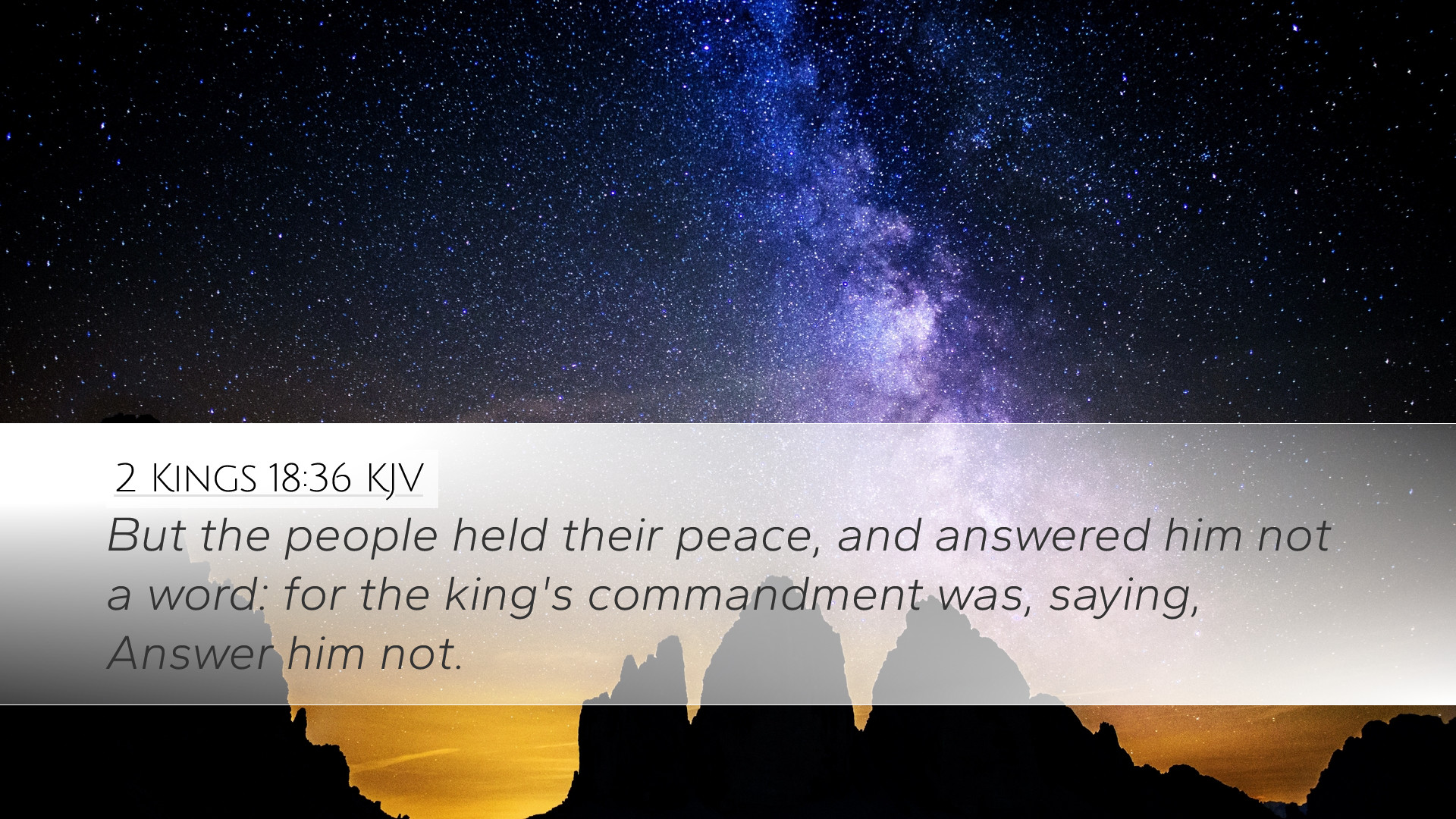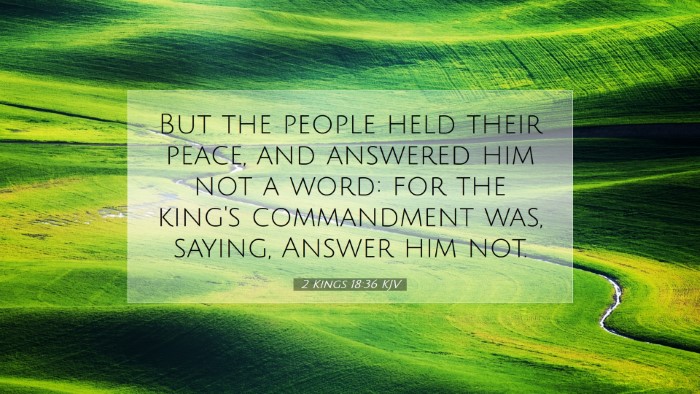Commentary on 2 Kings 18:36
Verse Reference:
2 Kings 18:36 (KJV) - "But the people held their peace, and answered him not a word: for the king's commandment was, saying, Answer him not."
Introduction
This verse occurs during a critical moment in the siege of Jerusalem by the Assyrian king Sennacherib. The atmosphere is charged with fear and tension, as the people of Judah are confronted with fierce intimidation. The directive given by King Hezekiah to remain silent carries significant implications not only for the immediate context but also for its theological and spiritual dimensions. In this commentary, we will explore the nuances of this verse through insights from several respected theologians and commentators.
Contextual Analysis
The historical context surrounding 2 Kings 18 is vital for understanding this verse. The threat posed by the Assyrians, who had already laid waste to much of Israel and were now demanding surrender from Jerusalem, was a stark reality for the inhabitants of Judah.
As noted by Matthew Henry, the behavior of the people reflects a deeper recognition of their predicament—they are faced with a powerful enemy and have likely experienced both fear and resignation. The silence they chose was, therefore, both an expression of their vulnerability and a submission to the authority of their king.
The King’s Command and Its Implications
King Hezekiah's command not to answer the Assyrian envoy (the Rabshakeh) is significant. It signals a moment of strategic restraint. Albert Barnes points out that sometimes silence can be more powerful than speech, especially in the face of false accusations or threats. By instructing his people to remain silent, Hezekiah not only protects them from further intimidation but also acknowledges the futility of arguing with an adversary who twists the truth for coercive purposes.
- Spiritual Warfare: This silence can be interpreted as a form of spiritual warfare. Adam Clarke suggests that Hezekiah's command to remain silent serves as an act of faith, trusting that God would intervene rather than attempting to defend themselves through human means.
- Listening to God: The decision to stay silent may reflect the need to listen attentively to God rather than getting embroiled in meaningless debates with those who have no regard for divine authority.
- Public Witness: Their silence could also be a profound public witness to their reliance on God's deliverance, illustrating to surrounding nations their commitment to not be swayed by fear.
Facing Intimidation
When confronted with the powerful voice of the enemy, the people’s silence can be seen as both an act of fear and a calculated choice. Matthew Henry remarks that while it was natural for the people to feel fear, their choice to answer not a word reflects a higher wisdom—recognizing that responses to arrogant taunts would bear no fruit other than escalating tension.
This teaches that in moments of spiritual and emotional upheaval, silence can often be a better response than making hasty declarations fraught with panic or doubt. Albert Barnes emphasizes that misguided attempts at justification or rebuttal may lead to further suffering or misinterpretation of one’s motives.
Silence Before God
Hezekiah’s command to remain silent resonates with biblical themes of waiting upon God. Various Scriptures illustrate the virtue of waiting on the Lord (Isaiah 40:31; Psalm 27:14). This silence can thus be interpreted as an act of faith—a surrender to God’s will and timing.
This opens a space for divine intervention, as Adam Clarke notes. In moments of intense trial, God often calls His people to rest in His promise rather than struggle in their own strength. The refusal to engage in conversation with the Rabshakeh suggests a reliance on God’s sovereignty to resolve the situation.
The Role of Authority in the Face of Adversity
The dynamics of authority and submission are evident in this passage. The people’s silence is linked to their respect for the king’s leadership. Matthew Henry illustrates that Hezekiah’s directives created a unified front. Whether out of fear or faith, their obedience to the king was crucial in maintaining collective strength in a time of crisis.
- Leadership and Resilience: Such moments in history remind us that strong, wise leadership is invaluable. Leaders must often navigate their followers through perilous times with both strategy and calm assurance.
- Communal Response: Their decision to follow the king’s command illustrates the effectiveness of collective action borne from a tranquil spirit during turmoil.
Theological Reflections
This verse invites reflection on some deeper theological concepts. In moments of crisis, believers are often caught between the panic of their circumstances and the peace of God's presence. The people’s silence signifies a turning away from the panic of the moment towards a deeper trust in God's ability to deliver them, resonating with Barnes' observation that ultimate power belongs to God alone.
Moreover, the silence signifies a profound trust that God is aware of their plight. Clarke implies that it is often in silence and stillness that God speaks most clearly, challenging the faithful to reassess their focus and ensure their reliance is firmly placed on divine providence rather than circumstances.
Conclusion
The admonition in 2 Kings 18:36 remains relevant for contemporary believers facing their own trials. The call to sometimes remain silent, to submit to divine authority, and to trust in God’s provision is timeless. Matthew Henry encapsulates this by reminding us that there are moments when the best response is not to engage in verbal warfare, but to quiet the soul in the presence of God—embracing the assurance that He is sovereign over every situation.
In considering the silence in 2 Kings 18:36, we are reminded that our battles are not merely flesh and blood, but spiritual in nature. Thus, we are called to be steadfast, patient, and faithful, awaiting the hand of God to act in His perfect timing.


